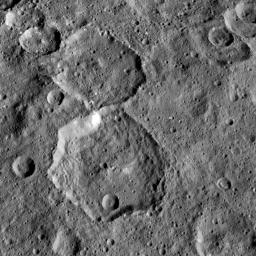
|
Fejokoo Crater
- Click the image above for a larger view
- Full-Res JPEG (1024 x 1024) (248.9 kB)
- Full-Res TIFF (1024 x 1024) (1.1 MB)
Caption:
NASA's Dawn mission has found that craters on Ceres show a diversity of shapes that provide important clues about the structure of Ceres' subsurface.
The bottom half of this pair of craters is called Fejokoo, named after the Nigerian god who supplied yams. The hexagonal shape of that 42-mile (68-kilometer) crater is probably due to the presence of fractures in the crust, along which the crater rims tend to align.
Polygonal craters are frequent on Ceres. Most display six or seven sides, like in the case of Fejokoo, but a few nonagons -- nine-sided shapes -- have been discovered. Polygonal craters are also commonly found on other solar system bodies, such as Mars, Earth's moon and icy moons of giant planets.
Dawn took this image on May 4, 2015, from an altitude of 915 miles (1,470 kilometers). The image has a resolution of 450 feet (140 meters) per pixel.
Background Info:
Dawn's mission is managed by JPL for NASA's Science Mission Directorate in Washington. Dawn is a project of the directorate's Discovery Program, managed by NASA's Marshall Space Flight Center in Huntsville, Alabama. UCLA is responsible for overall Dawn mission science. Orbital ATK, Inc., in Dulles, Virginia, designed and built the spacecraft. The German Aerospace Center, the Max Planck Institute for Solar System Research, the Italian Space Agency and the Italian National Astrophysical Institute are international partners on the mission team. For a complete list of mission participants, see http://dawn.jpl.nasa.gov/mission .
For more information about the Dawn mission, visit http://dawn.jpl.nasa.gov .
Cataloging Keywords:
| Name | Value | Additional Values |
|---|---|---|
| Target | 1 Ceres | |
| System | Main Belt | |
| Target Type | Dwarf Planet | Asteroid |
| Mission | Dawn | |
| Instrument Host | Dawn | |
| Host Type | Orbiter | |
| Instrument | Framing Camera (FC) | |
| Detector | ||
| Extra Keywords | Crater, Grayscale | |
| Acquisition Date | ||
| Release Date | 2017-03-17 | |
| Date in Caption | 2015-05-04 | |
| Image Credit | NASA/JPL-Caltech/UCLA/MPS/DLR/IDA | |
| Source | photojournal.jpl.nasa.gov/catalog/PIA21399 | |
| Identifier | PIA21399 | |
